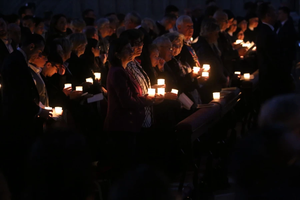The True Meaning of ‘Do This in Memory of Me’
In Holy Week especially, memory isn’t just remembering — it’s participating.

The childhood memories of the Stations of the Cross and the 3:00 p.m. Liturgy of the Lord’s Passion on Good Friday are ironed into my brain and heart. They were and are true opportunities to make contact with the gravity and seriousness of this most holy day.
I can clearly hear the refrain of “Were You There When They Crucified My Lord?” being sung as we solemnly walked the church grounds. I can visualize the priests, in their deep red vestments, laying prostrate in silence on the cold marble of the sanctuary exactly at 3 p.m.
Entering into the memory of childhood faith moments is powerful. Entering into the suffering, death and resurrection of Christ is the reason for Holy Week. Jesus knew that his followers, and the believers that would come, would need a good memory to endure the future. However, the true sense of Catholic memory is even more than that.
It is for this reason that Jesus states, “Do this in memory of me” following his institution of the Eucharist and the priesthood, which we mark on Holy Thursday. The word Jesus used and is translated as “memory” is anamnesis.
Anamnesis literally means “to make a past event present, now.” So, when Christ was at the Last Supper with his closest friends, he was telling them that when they take bread and wine and recite these words, he will be present with them. Before Christ offered his life on Golgotha, he gave it to us in the Eucharist.
At each Mass, we enter into the one moment in time when Jesus gave his life on the cross for you and for me. That is why this moment is so sacred. That is why we kneel. Access to this moment is made possible because of the type of moment it is and because of Who performed the action.
Christ’s death defeated the power of death so we may rise with Christ (John 11:25).
In order for Jesus to destroy death, he enters death (outside of time) and dismantles its power. Therefore, the saving moments of Jesus’ suffering, death and resurrection can be accessed throughout all of time. They are moments that exist outside of time.
This is the true sense of Passion memory in Holy Week, for the good of our souls.
The entrance into the holiest week of the year is an intense invitation to spend time with Christ as he is betrayed, mocked, beaten, whipped, deserted and nailed to a tree. C.S. Lewis, in his last published book, Letters to Malcolm, calls for Christians to respond differently than the first witnesses of these events:
… all is not lost. There is still an appeal to the People — the poor and simple whom He had blessed, whom He had healed and fed and taught, to whom He Himself belongs.
The Lord stands before us, beckoning us to remember what he means by “memory.”
As we are placed in front of these mysteries during Holy Week, and at each Sacrifice of the Mass, may we reject boredom, dreariness and betrayal. Let us be intentionally aware of the truth that we stand before the King of Kings who suffocated to death out of love for you and for me. Then the true sense of Passion memory will embolden us to arise differently on that Easter Sunday morn.
















